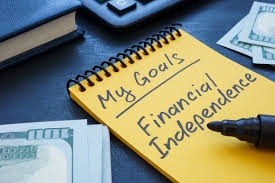BuildingYour Financial Independence
Financial independence means different things to different people. For some, it’s simply feeling in control of their money and having savings set aside for the future. For others, it means having enough income or assets to live comfortably without needing to work at all. Whatever your definition, reaching financial independence comes with several important benefits: preparing for retirement, reducing stress about money, and gaining the freedom to travel, explore hobbies, or take life at your own pace.
If you’ve been feeling stuck financially or are just curious about how to build more freedom with your money, you’re not alone. Many people seek ways to improve their financial situation, and some turn to debt relief to help manage or eliminate burdensome debt first. But beyond that, there are actionable steps anyone can take to move toward independence. Here are seven tips to help you on your journey.
Define What Financial Independence Means to You
The first step toward financial independence is understanding what it really means for you personally. Do you want to retire early? Build a nest egg for peace of mind? Or maybe you dream of starting your own business or traveling the world?
Having a clear vision will help you set realistic goals and stay motivated. Write down what financial independence looks like for you—whether it’s a dollar amount saved, debt-free living, or having passive income streams. Your goals should reflect your unique values and lifestyle.
Create a Budget That Works for You
Budgeting might sound like a drag, but it’s a powerful tool for building financial control. When you track your income and expenses, you see exactly where your money goes and where you can cut back or save more.
Make your budget flexible and realistic. Don’t forget to include money for fun and self-care—financial independence isn’t about deprivation, it’s about balance. Over time, a budget helps you reduce unnecessary spending and increase savings, giving you more control over your financial future.
Pay Down Debt Strategically
Debt can be a major obstacle to financial independence. High-interest debt, like credit cards or payday loans, eats away at your money and limits your ability to save.
Consider options like debt consolidation or professional debt relief if you’re struggling with multiple debts. Creating a payoff plan—whether it’s the debt snowball method (paying off smallest debts first) or avalanche method (tackling highest interest rates first)—can help you stay organized and motivated. Becoming debt-free frees up cash flow and reduces stress.
Build an Emergency Fund
Unexpected expenses happen to everyone—car repairs, medical bills, or job changes can pop up without warning. An emergency fund acts as a financial safety net, preventing these surprises from derailing your progress.
Aim to save three to six months’ worth of essential living expenses. Start small if you need to, but be consistent. Having this fund gives you peace of mind and keeps you from falling back on credit or loans when life throws curveballs.
Invest in Your Future
Once you have a handle on budgeting and debt, start thinking about growing your wealth. Investing might seem intimidating, but even small contributions to retirement accounts or diversified funds can make a big difference over time.
The power of compound interest means that the earlier you start, the more your money can grow. Consider speaking with a financial advisor or using educational resources to find investments that align with your risk tolerance and goals. Building assets is a key step toward financial independence.
Find Ways to Increase Your Income
Sometimes cutting expenses isn’t enough. Increasing your income can speed up your path to financial independence. This might mean asking for a raise, changing jobs, or starting a side hustle that fits your skills and interests.
Even a few extra hours a week can boost your savings and give you more options. Plus, developing multiple income streams adds resilience to your finances and can open doors to new opportunities.
Focus on Financial Wellness and Mindset
Financial independence isn’t just about numbers—it’s about how you think and feel about money. Building a healthy money mindset helps you make better decisions and stay motivated during setbacks.
Practice gratitude for what you have, celebrate small wins, and avoid comparing yourself to others. Financial stress can take a toll on mental health, so find healthy ways to cope and seek support when needed. A strong mindset keeps you moving forward with confidence.
Building financial independence is a journey unique to everyone. By defining your goals, budgeting smartly, paying down debt, saving for emergencies, investing wisely, increasing your income, and nurturing a positive money mindset, you create a foundation that brings freedom and peace. It takes time and effort, but each step you take is a move toward living life on your own terms. What’s your first step going to be?
READ MORE : Can Personalized Credentials Improve Both Security and Employee Belonging?

